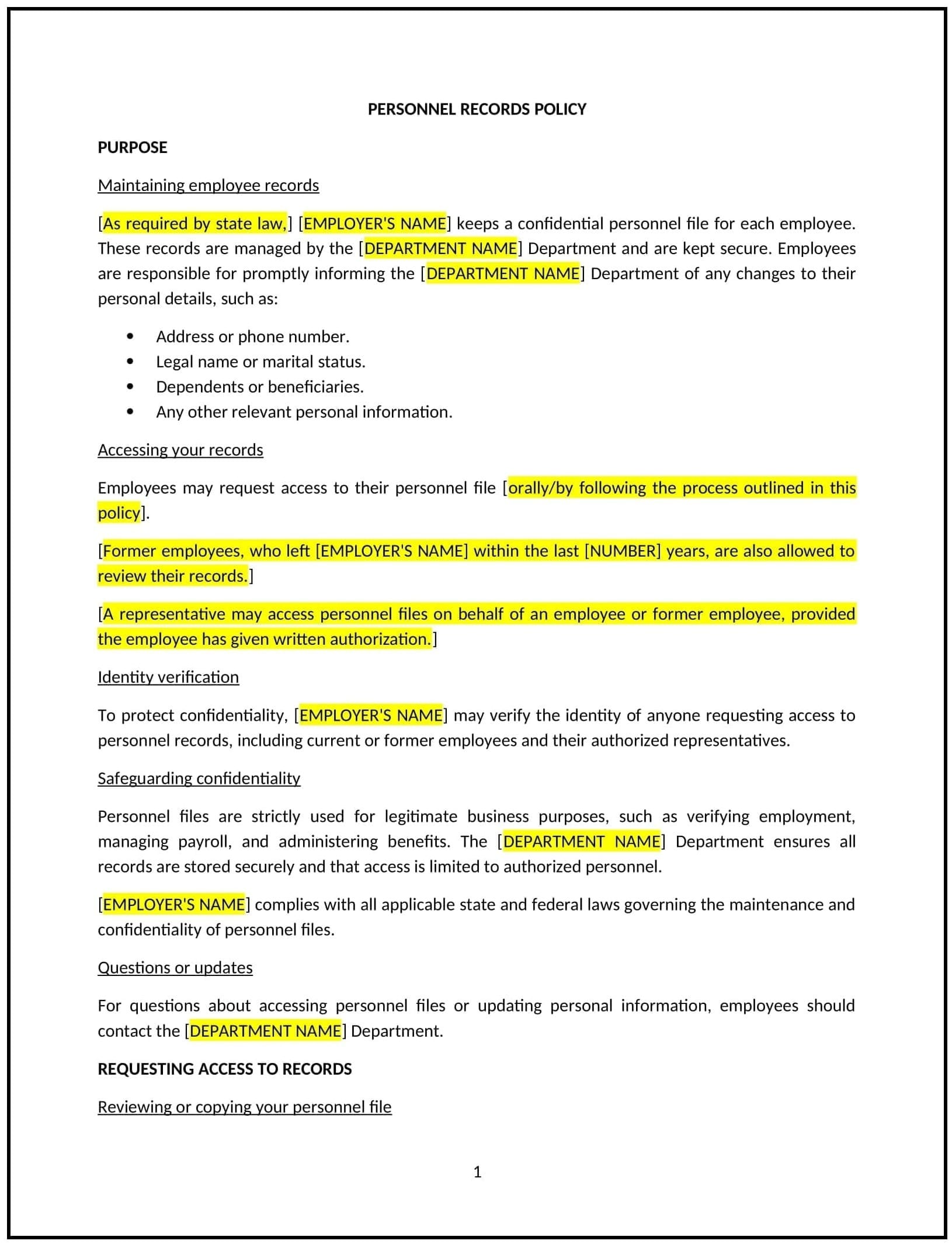Personnel records policy (New Mexico): Free template
Got contracts to review? While you're here for policies, let Cobrief make contract review effortless—start your free review now.

Customize this template for free
Personnel records policy (New Mexico)
This personnel records policy is designed to help New Mexico businesses manage employee records in a way that protects sensitive information, ensures data accuracy, and complies with state and federal privacy regulations. The policy outlines how employee records should be maintained, who has access to them, and how long they should be retained.
By adopting this policy, New Mexico businesses can safeguard employee privacy, streamline record-keeping practices, and reduce the risk of legal issues related to data handling.
How to use this personnel records policy (New Mexico)
- Define personnel records: Clearly outline what constitutes personnel records, including personal details (e.g., name, address, Social Security number), employment history, performance evaluations, disciplinary actions, benefits information, and other relevant documentation.
- Set access controls: Specify who has access to employee records, ensuring that only authorized personnel (such as HR, managers, or legal staff) can view sensitive information. Establish protocols for sharing or accessing records in compliance with New Mexico privacy laws.
- Implement data accuracy practices: Encourage regular reviews and updates of employee records to ensure that all information is accurate and up-to-date. Establish a process for employees to review and correct their records if necessary.
- Establish retention periods: Define how long personnel records should be retained, based on New Mexico state law and business needs. Set clear guidelines for how records will be disposed of once they are no longer required.
- Reflect New Mexico-specific considerations: Include any specific New Mexico laws, such as those related to the retention of employee records or privacy regulations, which may impact the management of personnel records in the state.
Benefits of using this personnel records policy (New Mexico)
Implementing this policy provides New Mexico businesses with several advantages:
- Protects employee privacy: By establishing clear guidelines for managing personnel records, businesses can ensure that sensitive information is protected and not shared inappropriately.
- Ensures legal protection: A well-managed personnel records policy helps businesses comply with privacy and employment laws, reducing the risk of legal issues related to mishandling or unauthorized access to records.
- Streamlines record management: By defining how records should be stored, updated, and disposed of, businesses can ensure that personnel records are handled consistently, improving operational efficiency.
- Enhances transparency: Employees are more likely to trust the company if they understand how their personal and professional data is managed. This transparency helps build trust and improves employee relations.
- Supports accurate decision-making: Accurate and up-to-date personnel records help businesses make informed decisions regarding employee promotions, raises, disciplinary actions, and other personnel matters.
Tips for using this personnel records policy (New Mexico)
- Communicate the policy clearly: Ensure that all employees understand how their records will be handled. The policy should be shared with employees during onboarding and periodically reviewed to ensure they are aware of their rights and the company’s practices.
- Maintain confidentiality: Ensure that all personnel records are stored securely, whether in physical or electronic format. Implement access controls and encryption to protect sensitive information from unauthorized access.
- Regularly review records: Implement a process for regularly reviewing and updating personnel records to ensure they remain accurate. Employees should be notified when their records are updated, especially if any personal information changes.
- Dispose of records properly: When personnel records are no longer required or have exceeded the retention period, businesses should implement secure methods of disposal, such as shredding paper records or permanently deleting electronic files.
- Review the policy regularly: The policy should be reviewed periodically, at least once a year, to ensure it remains aligned with New Mexico labor laws, data privacy regulations, and evolving business needs.